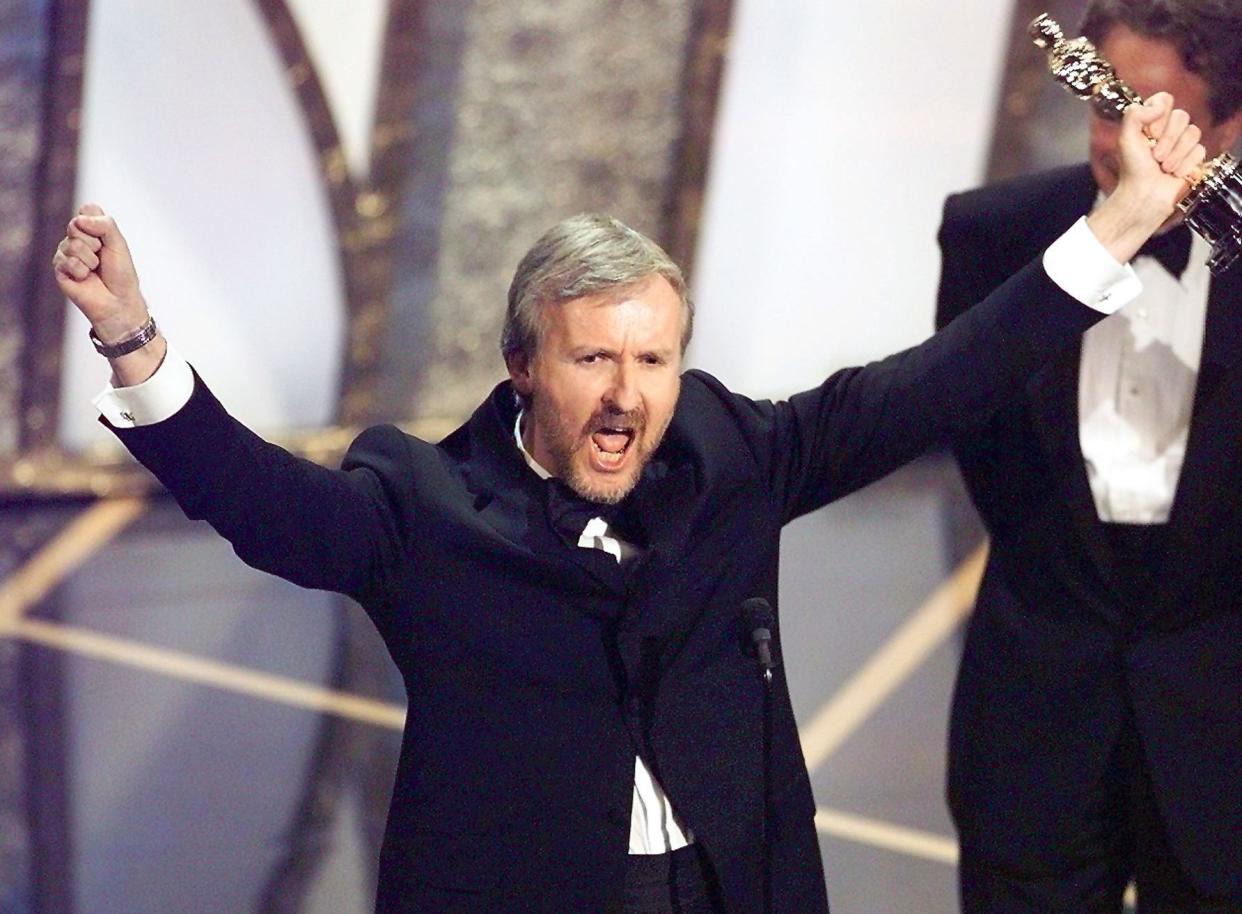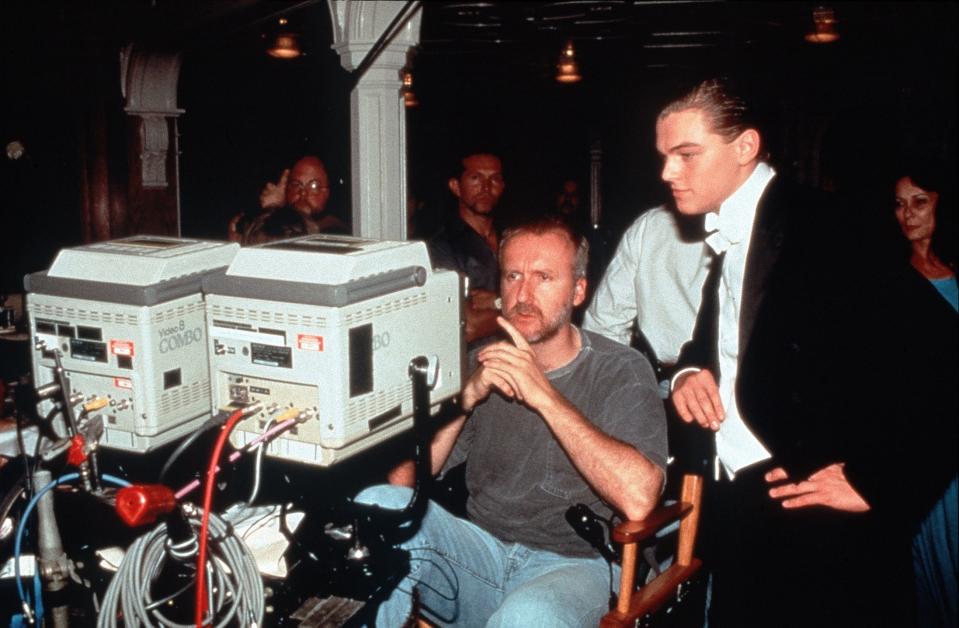'Titanic' Oscars 20 years later: Revisiting James Cameron's cringe-worthy 'king of the world' moment

In the end, it was probably the hooting that sank James Cameron’s Titanic Oscar moment. Nearly 20 years ago, on March 23, 1998, the filmmaker loudly proclaimed, “I’m the king of the world!” while accepting the Best Director prize for his record-shattering blockbuster, which was nominated in 14 categories and took home 11 statuettes on Oscar night, tying a record set almost 40 years earlier by Ben-Hur. (In 2004, The Return of the King, the final chapter in Peter Jackson’s Lord of the Rings trilogy, became only the third film in Oscar history to reach that magic number.)
Of course, Cameron was merely quoting his own Oscar-nominated dialogue shouted so memorably in the movie by his not-nominated (and therefore not in attendance at the Oscars) leading man, Leonardo DiCaprio. When the actor crowed, “I’m the king of the world!” to the rooftops, moviegoers swooned. When the director repeated it from the Shrine Auditorium in L.A., he inadvertently created a moment that now resides in Oscar infamy alongside Adrien Brody forcibly smooching Halle Berry and John Travolta’s “Adele Dazeem” faceplant. (Relive the awkwardness by watching Cameron’s acceptance speech below.)
Seen again two decades later, Cameron’s “king of the world” boast itself isn’t egregiously off-putting. In fact, the crowd laughs along appreciatively, enjoying the shout-out to DiCaprio’s joyful shout. That laughter — if not the applause — abruptly ends when the director starts crowing, his arms lifted aloft in triumph. It’s an image that, unfairly or not, leans into Cameron’s reputation as a filmmaker whose exacting perfectionism steps up to and, for some, crosses the line into egomania. Had another one of that year’s nominated directors — say, Good Will Hunting‘s Gus Van Sant or The Full Monty‘s Peter Cattaneo (yes, The Full Monty was a big Oscar player that year) — recycled that quote in his victory speech, few eyebrows would likely have been raised, as their public personalities weren’t as sharply defined. Also, none of them were in the public eye to the extent that Cameron had been because of Titanic‘s famously troubled production history, which included regular reports of budget overruns and release-date delays. His supreme confidence kept him going through all the turbulent behind-the-scenes drama, but once the movie became a sensation, that confidence read as boastful in an industry that prefers a humbler reaction to massive success.
What’s often lost amid the “king of the world” brouhaha is the fact that Cameron delivered three speeches that night, and each feels like an apology of sorts for the preceding speech. Early in the evening, he shared Titanic‘s win for Film Editing with fellow editors Conrad Buff and Richard A. Harris, and let both of them speak first. Each of his collaborators thanked his colleagues and spouse, whereas Cameron singled out his 5-year-old daughter, Josephine, whose mother — Cameron’s then-wife Linda Hamilton — was in the audience. “Honey, this is the thing I described to you,” he said. “It’s called an Oscar, and it’s really cool to get.” In his head, that probably sounded like a charming father-daughter exchange, but it’s more cringe-inducing when spoken aloud, presaging what was to come later in the night.
When presenter Warren Beatty announced Cameron’s name as Best Director — a Beatty-declared victory that didn’t require a do-over — the filmmaker wisely opted to address his cast rather than his kid. “I don’t know about you, but I’m having a really great time,” he began, before calling out old and young Rose — seatmates Kate Winslet and Gloria Stuart, who were nominated for Best Actress and Best Supporting Actress, respectively — along with the absent DiCaprio and the large supporting cast. “You guys gave me pure gold every day, and I share this gold with you.”

Continuing in that “no i in team” vein, he acknowledged the larger Titanic crew, as well as the various members of his family — Hamilton, their children, and his parents. “There is no way that I can express to you what I’m feeling right now,” Cameron said, visibly moved. “My heart is full to bursting.” In another world, his speech stopped there and he departed the stage as Oscar royalty. But on our earth, he kept going and unwisely proclaimed himself king.
Perhaps word filtered backstage to Cameron that his DiCaprio impression didn’t go over so well, because he didn’t attempt anything like it again in his final appearance that night, when he accepted Titanic‘s Best Picture statue from Sean Connery. Producer Jon Landau spoke first, rattling off the lengthy list of people who helped make the movie possible so Cameron wouldn’t have to, which earned him a backhanded compliment from the director when it was his turn at the mic. “I think Jon saw Shine too many times,” Cameron said, referring to the 1996 Best Picture nominee starring Oscar winner Geoffrey Rush as mentally troubled pianist David Helfgott. “He thanked everybody and did everything I was going to say.” (Watch his Best Picture speech below.)
Not that Cameron proved in any way speechless. Looking beyond the film, he turned his attention first to the audience that embraced it and then to the real-life event that inspired it. “It’s kind of hard for us to remember that this euphoria … is for a film that’s based on a real event that happened, where real people died,” he said somberly, summarizing the film’s message as “the future is unknowable, the only thing we truly own is today” — a sentiment that notably sounds closer to Terminator than Titanic. “I’d like to do a few seconds of silence in remembrance of the 1,500 men, women, and children who died when the great ship died. During these few seconds I’d like you to also listen to the beating of your own heart, which is the most precious thing in the world.”
So, at Cameron’s poetic urging, the audience that audibly rolled their eyes through his “king of the world” boast fell silent as the camera cut to a wide view of the room rather than single out specific faces. After a longer-than-anticipated pause, the director tossed out his last (self-) congratulatory remark of the evening. “You really made this a night to remember in every way,” knowingly name-dropping the previous Titanic film, 1958’s A Night to Remember. “Now let’s go party till dawn!”
In the years since the nonstop party that was Cameron’s 1998 Oscar night, the director has owned up to how his “king of the world” moment put a dent in the festivities. “After jumping up and making a fool of myself with my acceptance speech, I’m sure nobody wants to see me at the Academy Awards again,” he semi-jokingly told Entertainment Weekly in 2010, just before he received his second directing nod for Avatar. And just last November, he sounded an even more regretful note when speaking with Vanity Fair. “I now realize what was wrong with my choice to do that. There’s a hubris in assuming that everybody in the audience has seen your movie, even though you won. Or that they’re actually all fans. It was all phrased pretty carefully, but the error was that I was actually acting prideful about winning, and with a reference to my own film.” Here’s one upside to Cameron’s faux pas: We’ll definitely be spared an “I see you” reference when he wins his second Oscar for one of the many Avatar sequels.
Read more from Yahoo Entertainment:


